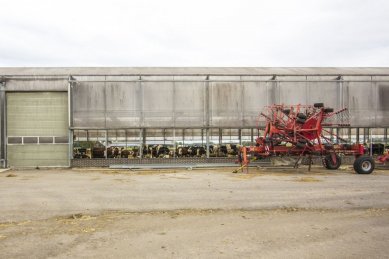
Víctor Muñoz Sanz: Lights-Out
Environments and Interfaces of Nonhuman Labor
Pořadatel
Galerie VI PER
Místo konání
Vítkova 2, Praha 8
Start
mon 01.4.2019 19:00
Odkaz
http://www ...
Galerie VI PER
Místo konání
Vítkova 2, Praha 8
Start
mon 01.4.2019 19:00
Odkaz
http://www ...
Lectures
Publisher
Lights-out operation (without lighting) refers to the control of manufacturing or logistics facilities using remote management software. They can be found in places that are fully automated and largely unstaffed, challenging conventional concepts defining architectural space, such as light, ventilation, or movements of people and their proportions; and also its perception, as those conducting remote control observe these spaces and their inhabitants merely as data landscapes on a screen. Based on the logic of spatial and regulatory platforms for automated work, both people and non-people perceive their bodies and behaviors conditionally, and new forms of territoriality, segregation, and social competition emerge.
The lecture will offer a panorama of newly emerging spatial typologies and configurations, users, and user needs arising from the ever-expanding use of automation technologies in production and logistics. Through thorough exploration of anonymous architectures, patent drawings, promotional brochures, robots, workplaces, and the stories of the people behind them, this research demonstrates how the architectural outcome of corporate innovations and revolutionary industrial platforms transforms conventional architectural practices – and offers a perspective on Giedion's "anonymous history" – as it becomes a reality today.
Víctor Muñoz Sanz is an architect, researcher, and educator based in the Netherlands. He studied architecture at ETSA in Madrid (2006), graduated with honors with a master’s degree in architecture from Harvard University (2011), and obtained his PhD in architecture with honors again at ETSA in Madrid (2016). In his work, he explores the concept of “workscapes,” which are areas and architectures where work is carried out by both humans and non-humans, and spaces formed by initiatives and innovations of industrial entrepreneurs. Following extensive fieldwork supported by the Druker Travelling Fellowship from Harvard Graduate School of Design, he wrote his doctoral dissertation Networked Utopia on the transnational urbanism of the Baťa company. Since 2016, he has been exploring contemporary industrial areas in the context of radical changes in politics and manufacturing technologies at various institutions and in different research formats. As Emerging Curator 2015-16, he led discussions at the Canadian Centre for Architecture in Montreal on the legacy of activities initiated by corporate firms in industrial offshore destinations, which were published as an audio-documentary film Off:Re:Onshore. As a postdoctoral researcher at TU Delft, he is part of the Cities of Making research project, which investigates possibilities for enhancing urban manufacturing. As a chief co-researcher of the Automated Landscapes project at Het Nieuwe Instituut and at the Faculty of Architecture and the Built Environment at TU Delft, he focuses on researching newly emerging automation spaces. This research has been presented, among other venues, as part of the Dutch pavilion at the 2018 Venice Architecture Biennale, in the form of essays in Volume, e-flux Architecture, Work Body Leisure, and Harvard Design Magazine, and through numerous lectures. Currently, Muñoz Sanz teaches this theme at TU Delft. From September 2019, he will be a fellow at the Akademie Schloss Solitude in Stuttgart.
Introductory photo: Dairy farm De Klaverhof, Moerdijk, 2018 (Víctor Muñoz Sanz).
The lecture will offer a panorama of newly emerging spatial typologies and configurations, users, and user needs arising from the ever-expanding use of automation technologies in production and logistics. Through thorough exploration of anonymous architectures, patent drawings, promotional brochures, robots, workplaces, and the stories of the people behind them, this research demonstrates how the architectural outcome of corporate innovations and revolutionary industrial platforms transforms conventional architectural practices – and offers a perspective on Giedion's "anonymous history" – as it becomes a reality today.
Víctor Muñoz Sanz is an architect, researcher, and educator based in the Netherlands. He studied architecture at ETSA in Madrid (2006), graduated with honors with a master’s degree in architecture from Harvard University (2011), and obtained his PhD in architecture with honors again at ETSA in Madrid (2016). In his work, he explores the concept of “workscapes,” which are areas and architectures where work is carried out by both humans and non-humans, and spaces formed by initiatives and innovations of industrial entrepreneurs. Following extensive fieldwork supported by the Druker Travelling Fellowship from Harvard Graduate School of Design, he wrote his doctoral dissertation Networked Utopia on the transnational urbanism of the Baťa company. Since 2016, he has been exploring contemporary industrial areas in the context of radical changes in politics and manufacturing technologies at various institutions and in different research formats. As Emerging Curator 2015-16, he led discussions at the Canadian Centre for Architecture in Montreal on the legacy of activities initiated by corporate firms in industrial offshore destinations, which were published as an audio-documentary film Off:Re:Onshore. As a postdoctoral researcher at TU Delft, he is part of the Cities of Making research project, which investigates possibilities for enhancing urban manufacturing. As a chief co-researcher of the Automated Landscapes project at Het Nieuwe Instituut and at the Faculty of Architecture and the Built Environment at TU Delft, he focuses on researching newly emerging automation spaces. This research has been presented, among other venues, as part of the Dutch pavilion at the 2018 Venice Architecture Biennale, in the form of essays in Volume, e-flux Architecture, Work Body Leisure, and Harvard Design Magazine, and through numerous lectures. Currently, Muñoz Sanz teaches this theme at TU Delft. From September 2019, he will be a fellow at the Akademie Schloss Solitude in Stuttgart.
Introductory photo: Dairy farm De Klaverhof, Moerdijk, 2018 (Víctor Muñoz Sanz).
The English translation is powered by AI tool. Switch to Czech to view the original text source.

0 comments
add comment









